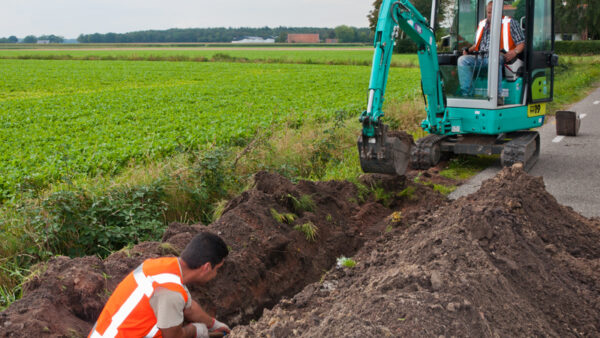Brexit and the UK government’s handling of it have been blamed as latest statistics show continuing decline in UK construction output while, on the continent, German construction is booming.
The UK’s overall construction output fell 1.2% in the three months to the end of July, fuelled by declines in repair and maintenance work and new activity, according to new data from the UK’s Office for National Statistics (ONS).
But according to the Purchasing Managers’ Index (PMI), Germany has experienced its fastest rise in new construction work since the survey began in September 1999.
Changes in policy that result in a reduction to migrant workers could seriously impact the industry for years to come. The Government needs to get its act together and put a more positive plan in place– Mark Robinson, Scape Group
Some in the UK industry have blamed Brexit for the UK doldrums, and one figure has urged the government of Prime Minister Theresa May to “get its act together” and formulate a plan.
UK output also dipped between June and July, down 0.9%, largely due to a 1.4% fall in new work.
The ONS said both the month-on-month and three-month on three-month periods fell for the fourth consecutive month in July 2017, although it added that despite this, construction output remained at a relatively high level.
“Construction output peaked in January 2017, reaching a level that was 24.9% higher than the lowest point of the last five years, January 2013.
“Despite falling in July 2017, construction output remains 21.0% above this level,” it said.
German construction, meanwhile, is growing at “record pace”, according to the PMI. The survey data from IHS Markit showed that growth was broad-based across residential, commercial and civil engineering, although the overall rate of expansion was the weakest since April.
Construction employment increased at the sharpest rate for a year-and-a-half, and usage of subcontractors rose markedly. Inflation of subcontractor rates remained close to June’s record high, while prices for construction inputs increased at the sharpest rate in nearly five-and-a-half years.
Purchasing activity increased at the fastest rate since February 2016. This generated further pressure on supply chains, with average input delivery times lengthening to the greatest extent since December 2006. Input prices paid by construction firms continued to rise sharply, and the rate of inflation strengthened to a 65-month high.
Trevor Balchin, director, economics at IHS Markit, said: “The German construction boom showed little sign of easing in August, as new orders increased at the fastest rate on record. Overall activity continued to grow strongly, despite a slight weakening of momentum since July.
“Survey indicators continued to signal capacity pressures, with suppliers’ delivery times lengthening by the most since December 2006 and the availability of subcontractors declining sharply. Rates charged by sub-contractors increased at the second-fastest pace on record and construction input price inflation accelerated to the strongest in nearly five-and-a-half years.”
Brexit came under fire from Simon Rawlinson, head of strategic research at multinational consultant Arcadis.
“We anticipated that Brexit would begin to have an impact on key construction markets in 2017 and there are signs that uncertainty is now feeding directly into the opportunities available for contractors,” he told UK magazine, Building.
“It is essential that clients and contractors work together to get projects to site in order to maintain activity, employment and investment levels in the face of a challenging market.”
Mark Robinson, chief executive of procurement body, Scape Group, urged the government to “get its act together”.
“It has been over a year since the UK’s vote to leave the EU and the Government still do not have a solid plan in place,” he said.
“Increased construction costs and general uncertainty already has the industry rattled – and the leaked immigration documents this week will have sent many into uproar. Changes in policy that result in a reduction to migrant workers – such as increased hiring costs or bureaucratic burdens – could seriously impact the industry for years to come. The Government needs to get its act together and put a more positive plan in place.
“If we are to have fewer hands on deck in construction we need to find better ways of working. Greater collaboration and better procurement practices are needed to increase efficiency and the quality delivery of pipelines. This should include giving greater consideration to the ways in which the public and private sectors can work together to save on time and cost.”
Image: Reconstruction of the Berlin City Palace on Spree Island, courtesy of formwork specialist, PERI
Comments
Comments are closed.











Mark and Simon are dead right. But has it really taken 18months to realise this??? Come on CIOB !!! Put some pressure on and tell us what then happened.
Give great consideration????? are we builders or shop assistants. Given that the construction industry is the barometer of the UK’s success are we no heading for another failed economy. If so then lets do something now. DONT HOLD BACK.
Steve Townsend
What an un interesting misleading article, as Germany following years of low interest rates and massive investment since 2009 is finally reaping the benefits of mass home owning histeria, funded by the need to house all the mass immigration ( working aged men needed to work as the base level of construction workers as 30% of the skilled workforce retires)
As for the lack of sub contractors .. why is it surprising with 60 day payment terms the norm, lack of skilled workforce availability following years of failure to train and ever tightened budgets forced by the very people who complain ( coupled with incresed material costs)
Brexit is blamed for it seems everything going on in the UK at the moment , one would hope the large increase in manufacturing, low levels of unemployment etc could also be accredited to it ?
Below article is an interesting read as well
https://ec.europa.eu/docsroom/documents/23744/attachments/1/translations/en/renditions/pdf